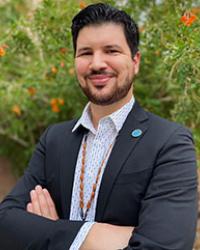Faculty

Professor Danielle Finn serves as the Program Director of the Indian Nations Gaming & Governance Program and Assistant Professor-in-Residence. Additionally, she serves as the Faculty Advisor to UNLV’s Native American Law Student Association and the Secretary of the Tribal Law Section of the State Bar of Nevada. She holds a life appointment to the bench as an Associate Judge for the Cheyenne River Sioux Tribe in South Dakota and is academic faculty for Sinte Gleska University and the National Judicial College.
Previously, Professor Finn served as the Native American Affairs Advisor for the Office of the Governor of the State of Minnesota and the External Affairs Director for the Standing Rock Sioux Tribe. Professor Finn obtained an LL.M. from the University of Oklahoma in Indigenous Peoples Law and a J.D. from Arizona State University’s Sandra Day O’Connor College of Law with a Certificate in Global Arbitration from Mitchell Hamline School of Law.
She has received numerous accolades over her career including, but not limited to: The National Judicial College’s 1 of 60 Courageous Judges in 2023, 2020-2022 United State of Women Ambassador, North Dakota Leading Lady by the North Dakota Women’s Business Center in 2019, and 1 of 50 Faces of Indian Country by Indian Country Today Media Network in 2016. She is a board member for the Cheyenne River Youth Project and the American Indigenous Business Leaders (AIBL). Professor Finn is Hunkpapa Lakota, Inhanktowan Dakota, and Hohé Nakota and is a citizen of the Standing Rock Sioux Tribe.

Addie C. Rolnick is a scholar of Indian and tribal law. Her research focuses on indigenous justice systems, Native people’s encounters with non-tribal systems, and countering equal protection-based attacks on indigenous rights. She is a national leader in the area of Native youth and juvenile justice/child welfare. She has testified twice before the Senate Committee on Indian Affairs and regularly advises national policymakers. At UNLV, she teaches Tribal Law & Governance and oversees students who assist tribal governments with legal institution-building. She also teaches Federal Indian Law, Criminal Law, Juvenile Justice, Civil Rights, Critical Race Theory, and Law & Inequality: Policing, Protest & Reform.
Professor Rolnick is the Associate Director of UNLV’s Program on Race, Gender & Policing and a member of the National Academy of Sciences Ad Hoc Committee on Reducing Racial Disparities in the Criminal Justice System. In 2021, she served as a Visiting Professor at the University of Washington, where she taught American Indian Law. Prior to joining UNLV, she was the inaugural Critical Race Studies Law Fellow at UCLA School of Law. She has also represented tribal governments as an attorney and lobbyist with Sonosky, Chambers, Sachse, Endreson & Perry, LLP in Washington, D.C., and worked as a legislative drafting consultant to tribal governments. She received her J.D.and M.A. in American Indian Studies from UCLA. Visit Prof. Rolnick's faculty page for more about her scholarship and teaching.

With a career spanning nearly 30 years, John Tahsuda has extensive experience in matters affecting Native Americans and Tribal governments. He is a principal with Navigators Global, LLC, a full-service issues management, government relations, and strategic communications firm located in Washington, D.C. He is also the Managing Member of Innovative Tribal Strategies LLC, an Indian-owned consultancy that provides strategic advice to Indian Nations on business and government matters. Professor Tahsuda also currently serves as Chairman of the Board of Trustees for the Kiowa Casino Operations Authority. The Kiowa Casino Operations Authority is a wholly owned economic enterprise of the Kiowa Tribe of Oklahoma and is charged with building and operating gaming facilities and ancillary businesses for the Kiowa Tribe.
Before rejoining Navigators Global, Professor Tahsuda served as Senior Counselor to the Secretary of the Interior after serving two years as the Principal Deputy Assistant Secretary–Indian Affairs. In previous positions, he has also served as the staff director of the U.S. Senate Committee on Indian Affairs, general counsel and legislative director of the National Indian Gaming Association, general counsel for the Oneida Indian Nation, and adjunct professor of law at Cornell Law School. He has worked on a wide range of issues relating to federal policy and legislation affecting federal recognition, gaming, self-governance, natural resources, Indian health care and Indian education. Professor Tahsuda is dedicated to applying this experience and knowledge to the advancement of Tribal sovereignty and the betterment of Tribal communities. He is a member of the Kiowa Tribe of Oklahoma. He received a Juris Doctorate from Cornell Law School and B.S. in Organizational Management from Oklahoma State University. He is also the proud father of triplets.

Kathryn Rand (J.D. University of Michigan, B.A. University of North Dakota) served as Dean of the UND School of Law from 2009 to 2018, the first woman to hold the position. Professor Rand is widely recognized as among the nation’s leading experts on Indian gaming, federal Indian law, and Tribal-state-federal intergovernmental relations. She has published more than 50 articles and co-authored three books on Tribal gaming, including Indian Gaming Law: Cases and Materials (2008, 2d ed. 2019), Indian Gaming Law and Policy (2006, 2d ed. 2014), and Indian Gaming and Tribal Sovereignty: The Casino Compromise (2005). She has twice testified on Indian gaming regulation and oversight before the U.S. Senate Committee on Indian Affairs in Washington, D.C., as well as before the Sycuan Band of the Kumeyaay Nation. Her first book was featured on C-SPAN’s Book TV. She is a frequent commentator in the national media, including the New York Times and the Boston Globe, and has delivered invited lectures at Boston College, the University of Manitoba, the University of Helsinki, the University of Macau, and numerous law schools. Rand also has presented and published on academic leadership and diversity and inclusion in legal education. She is an elected member of the American Law Institute and was awarded UND’s highest award for faculty excellence in teaching, research, and service.

Steve Light (Ph.D. Northwestern, B.A. Yale) is a Professor of Political Science and Public Administration, former Interim Dean of Business and Public Administration, and Co-Director of the Institute for the Study of Tribal Gaming Law and Policy at the University of North Dakota (UND). The Institute is the first university research center dedicated to advancing knowledge and understanding of Indian gaming.
With Kathryn Rand (UND School of Law), Professor Light is widely recognized as among the nation’s leading experts on Indian gaming, federal Indian law, and Tribal-state-federal intergovernmental relations. He has published more than 50 articles and co-authored three books on Tribal gaming, including Indian Gaming Law: Cases and Materials (2008, 2d ed. 2019), Indian Gaming Law and Policy (2006, 2d ed. 2014), and Indian Gaming and Tribal Sovereignty: The Casino Compromise (2005), featured on C-SPAN’s Book TV. He has testified on Indian gaming regulation and oversight before the U.S. Senate Committee on Indian Affairs, serves on the Editorial Board of the Gaming Law Review, and is a member of the International Masters of Gaming Law and the ABA Business Law Section’s Gaming Law Committee.
He is a frequent commentator in the national media, including the New York Times, Washington Post, Wall Street Journal, Bloomberg, NPR, and Indian Country Today, has delivered invited lectures at Boston College, Stanford, the University of Macau, and numerous industry events. Professor Light’s research also includes organizational leadership and diversity and inclusion. He was awarded UND’s highest award for faculty excellence in teaching, research, and service.

Riana Durrett earned her B.A. in political science from UNLV and attended law school at UNLV's William S. Boyd School of Law, earning her J.D. in 2008. While attending UNLV, Durrett participated in several internship and externship programs, including a judicial internship for the Suquamish Tribe, where she is an enrolled tribal member. She recently completed her LL.M. in Gaming Law and Regulation from the William S. Boyd School of Law, where she also teaches cannabis law and regulation.
Durrett was appointed as director of the UNLV Cannabis Policy Institute in August 2023. In addition, the Governor appointed her to serve as the first vice chair of the Nevada Cannabis Compliance Board. Prior to her work with the Cannabis Compliance Board, Durrett served as the executive director of the Nevada Dispensary Association, where she established the association as the primary resource on best practices in Nevada's cannabis industry -- developing the Nevada Dispensary Association into the primary regulatory and government affairs voice for Nevada's cannabis industry. In addition to her work at UNLV, Durrett currently serves on the Boards of the Nevada Taxpayer Association and the Nevada Conservation League.

Kostan R. Lathouris, a citizen and elected Tribal Council Member of the Chemehuevi Indian Tribe, owns and manages Lathouris Law PLLC, a law practice dedicated to helping tribal nations assert and defend their sovereign rights. He is the Chief Judge of the Las Vegas Paiute Tribal Court and served on the Nevada Indian Commission from 2017 to 2023. He received his Juris Doctor from the William S. Boyd School of Law at the University of Nevada, Las Vegas in 2015.

Jay Spaan, citizen of the Cherokee Nation, is a passionate advocate for Tribal sovereignty and Self-Governance, serving as the Executive Director of the Self-Governance Communication & Education Tribal Consortium (SGCETC) since 2018. In this role, Jay has led a transformation of the organization into a hub for innovation and advocacy, forging strategic partnerships and creating impactful educational initiatives. Under his leadership, SGCETC launched the acclaimed original docuseries For Our People: Stories of Tribal Self-Governance and Sovereignty, showcasing powerful narratives that celebrate Tribal autonomy and innovation. Jay has also testified before Congress twice on issues related to Tribal Self-Governance authority, further underscoring his expertise and leadership in this field.
In addition to his role at SGCETC, Jay is an educator, sharing his knowledge as an Adjunct Faculty at Arizona State University. Since 2021, he has developed and taught courses on Tribal Self-Governance within the Sandra Day O’Connor School of Law, crafting curriculum that bridges legal theory and practical application.
Prior to his current roles, Jay honed his analytical and policy expertise during a 13-year tenure as a Senior Analyst at the U.S. Government Accountability Office. There, he led critical evaluations of federal programs, identified systemic challenges, and provided actionable recommendations to enhance government effectiveness. His work frequently informed Congressional oversight and decision-making, solidifying his reputation as a trusted voice in federal-tribal relations.
Jay’s academic credentials reflect his deep commitment to public service and Indian law. He holds a Master of Jurisprudence in Indian Law from the University of Tulsa and a Master of Public Affairs.